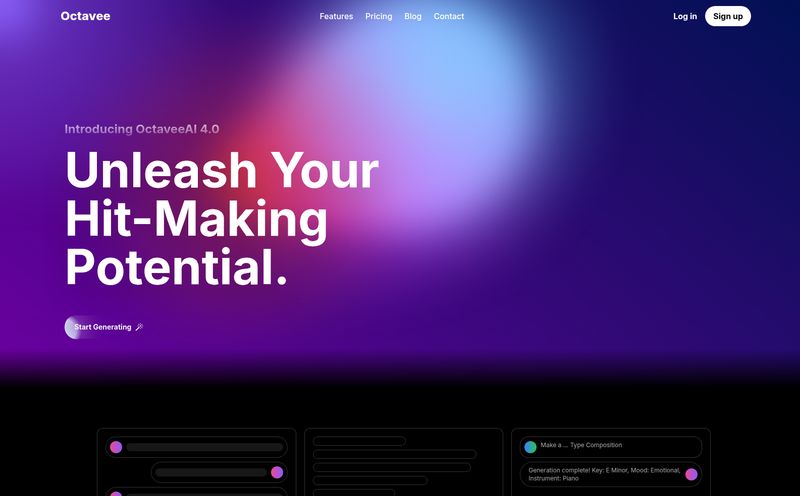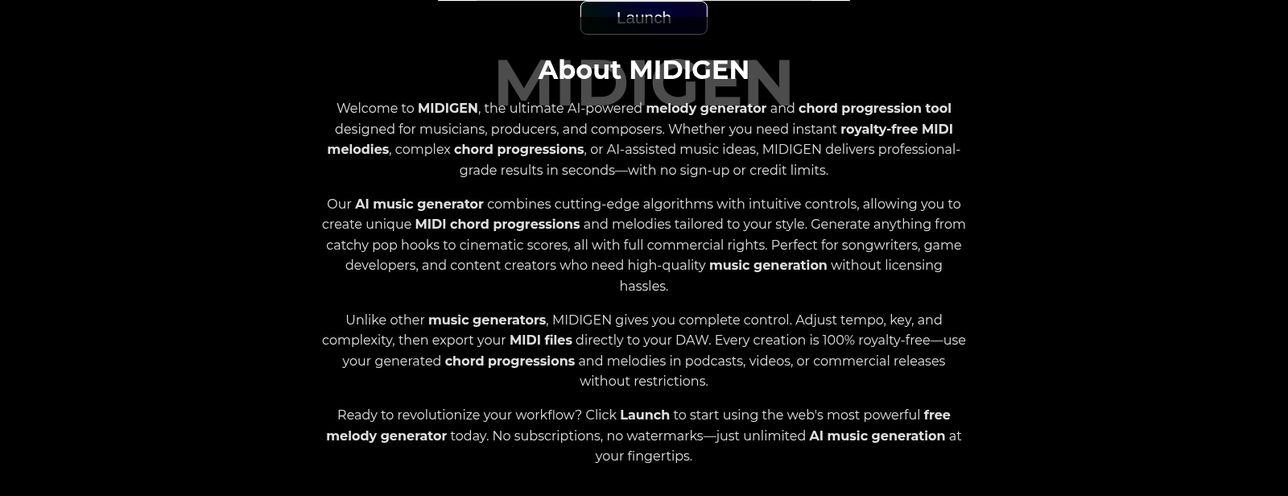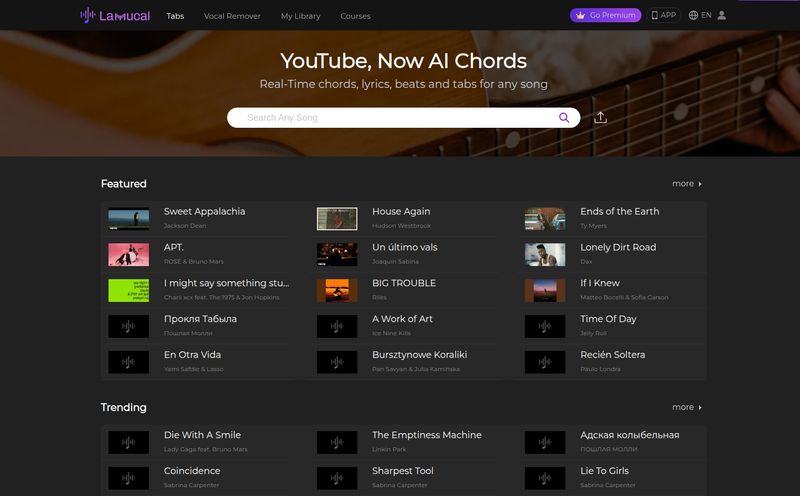If you're a content creator, you know the struggle. You’ve just finished editing the perfect video, the cuts are clean, the color grade is chef's kiss, and then it hits you. The dread. You need music. So you plunge into the depths of royalty-free music libraries, wading through endless pages of generic corporate ukulele tracks and overly dramatic cinematic scores. It’s a soul-crushing experience we’ve all shared.
What if you could just… describe the song you want and have it appear? A moody, lo-fi beat for a study vlog. An upbeat, 80s synth-pop track for a product reveal. That’s the promise of AI music generation, a field that's been exploding lately. And a new tool on the block, Song Demo AI, caught my eye. It claims to be an easy-to-use generator powered by some of the biggest names in the AI music space. So naturally, I had to see if it lived up to the hype.
So What Exactly is Song Demo AI Anyway?
At its heart, Song Demo AI is a web-based platform that turns your text prompts into original music. Think of it like a digital band-in-a-box. You're the director, telling it what you want, and the AI is the band, ready to play on command. What I found particularly interesting is that it isn't trying to reinvent the wheel entirely. It’s built on the shoulders of giants, specifically leveraging the power of Suno AI 3.5 and Udio AI—two of the most impressive AI music models out there right now. This is a smart move, it means the underlying quality has a pretty high ceiling from the get-go.
The interface itself is clean, almost starkly minimalist. When you log in, you’re greeted with a simple menu on the left that gets straight to the point.

Visit Song Demo AI
No fluff, no confusing dashboards. Just the tools you need to get started. I appreciate that. In my years in this game, I’ve seen too many tools with cluttered interfaces that just create a headache. This is… refreshing.
A Look Under the Hood at the Key Features
Okay, let's get into the nitty-gritty. What can this thing actually do? Based on its toolkit, it's aiming to be more of a sonic Swiss Army knife than a one-trick pony.
From Text to Tune The Core Creation Engine
This is the main event. The 'Creation' tab is where you type your musical dreams into a text box. For instance, I threw “A chill, acoustic folk song with a female vocalist, about watching the sunrise over a quiet lake” at it. A minute or so later, I had a surprisingly decent little track. The quality of AI music is massively dependent on the quality of your prompt. Be descriptive. Mention genre, mood, instrumentation, tempo, even vocal style. The more detail you give the AI, the better your results will be. It supports multiple languages too, which is a fantastic touch for global creators.
More Than Just Words Audio Input and Separation
Now this is where things get really interesting for the more technically inclined. Song Demo AI has an 'Audio Input' and 'Separation' feature. This implies you can upload your own audio files and, crucially, separate them into stems. For the uninitiated, that means taking a finished song and splitting it into individual tracks—vocals, drums, bass, guitar, etc. This is a massive deal for producers who want to remix a track or musicians who want to learn a specific part. It’s a feature I usually see in dedicated, and often expensive, software like iZotope RX or Lalal.ai, so seeing it here is a huge value-add.
Choose Your Voice The AI Singer Feature
Tired of just instrumentals? The 'AI Singer' option lets you add vocals to a track. You’re not just getting a random voice; you can seemingly choose from a selection of AI-generated singers. This moves the tool from being a simple background music generator to a genuine songwriting partner. You could create a full song demo, lyrics and all, without ever touching a microphone. The potential for quickly hashing out ideas is immense.
My Honest Take The Good and The Not-So-Good
No tool is perfect, right? After playing around with it, here’s my rundown. On the upside, the speed is impressive. Going from a text prompt to a downloadable MP3 in a couple of minutes feels like magic. The quality, thanks to the Suno and Udio backbone, is genuinely high. It’s not going to put human artists out of a job tomorrow, but for social media content, podcast intros, or just for fun? It’s more than good enough. And the fact that there are free generations available means you can try before you buy, which I always respect.
However, there are some caveats. The free service is, understandably, limited. You’ll burn through your free credits pretty quickly if you’re experimenting a lot. The biggest weakness, and this is true for all current AI, is its reliance on the prompt. A vague prompt will get you a vague, generic song. You have to learn how to “speak” to the AI. I also did run into a “Server error” page once while trying to access a sub-page, which could suggest the platform is still new and ironing out some kinks. It happens, but something to be aware of.
Let's Talk Money The Song Demo AI Pricing
So, what's the cost of this musical magic? The platform operates on a freemium model. You get a taste for free, but for heavy-duty use, you'll need to open your wallet. The website talks about a PRO version package. From what I can gather, going Pro gives you a larger volume of music generations and, most importantly, a royalty-free license to use the music you create in your projects and on social media. This is the key for any serious creator.
The exact pricing tiers and credit amounts weren't immediately available at the time of my review (that server error might have been the culprit). However, they have a dedicated VIP page where you can find the most current details. For anyone considering this for their YouTube channel or business, checking that license is step number one.
Who is This Tool Really For?
I see a few groups getting a real kick out of this.
- Content Creators: YouTubers, TikTokers, and podcasters who need an endless supply of unique, copyright-safe background music. This is your holy grail.
- Musicians & Producers: Perfect for rapidly prototyping song ideas. Instead of spending hours programming a drum beat and bass line, you can generate a vibe in minutes and build from there. The stem separation is a bonus for remixers.
- Indie Game Developers: Need a quick soundtrack for your new game? This could be a cost-effective way to get unique music for different levels and moods.
- Hobbyists: If you just think making music with words is cool (it is), then it’s a fantastically fun toy to play with.
The Final Verdict on Song Demo AI
So, is Song Demo AI a game-changer? For a certain type of user, I think it absolutely could be. It lowers the barrier to music creation to practically zero. The combination of a powerful text-to-music engine, AI singers, and advanced features like audio separation makes it a surprisingly robust package. It’s fast, the quality is solid, and it’s built on a foundation of proven AI models.
It's not without its quirks and the limitations of the free tier are real. But as a starting point, or as a tool for breaking creative blocks, it’s incredibly promising. The age of describing a feeling and getting a custom soundtrack back is here, and it’s only going to get weirder and more wonderful. Give the free version a spin; you might be surprised what your words can create.
Frequently Asked Questions
What is Song Demo AI?
Song Demo AI is an online platform that uses artificial intelligence to generate music from text descriptions. It utilizes powerful AI models like Suno AI 3.5 and Udio AI to create songs, instrumentals, and vocal tracks based on user prompts.
Is Song Demo AI free to use?
Yes, there is a free tier that allows you to generate a limited number of music tracks. For more extensive use and to get a royalty-free commercial license, you need to subscribe to their PRO version package.
Can I use the music I create commercially?
Music created under the free plan is generally for personal use. To use the music for commercial purposes like on YouTube, social media, or in advertisements, you typically need to upgrade to the PRO plan which provides a royalty-free license.
What AI models does it use?
Song Demo AI is powered by some of the leading AI music models currently available, specifically mentioning Suno AI 3.5 and Udio AI on its platform.
How good is the music quality?
The music quality is surprisingly high for an AI generator, largely because it leverages top-tier models. The final quality, however, heavily depends on the detail and clarity of your text prompt.
Do I need musical knowledge to use it?
Not at all. No musical theory or technical skill is required. If you can describe the music you want in words, you can use Song Demo AI to create it. It's designed for both musicians and non-musicians alike.



